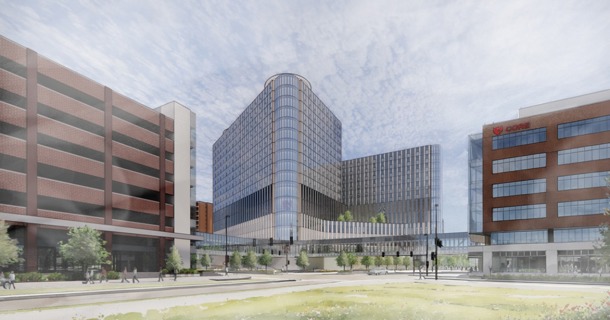Board of Regents approves second design phase for Project Health

On Friday, Oct. 3, the University of Nebraska Board of Regents approved the second design phase for Project Health, a transformational academic health care facility that will be based on the Omaha campus of the University of Nebraska Medical Center and its primary clinical partner, Nebraska Medicine.
The project, the first phase of the larger Project NExT initiative, will serve as a state-of-the-art clinical learning center to educate and train future health care providers, conduct cutting-edge research and expand access to clinical trials.
“As we look ahead, Project Health will not only transform our medical campus – it will help shape the future of health care for Nebraska,” said NU President Jeffrey P. Gold, M.D. “The visible progress already underway is a powerful reminder of the momentum we’ve built – and will continue to build – as we work to deliver on our bold vision for the state.”
The regent action authorizes construction of the shell and core of the facility. This work amounts to about $1.22 billion of the entire $2.19 billion project. Initial design phase approval, granted in April 2025, allowed for site preparation and foundational work to begin. A planned third phase, which also would require regental approval, would be necessary to complete the project. Funding for the project comes from several sources: philanthropy, the state of Nebraska; the city of Omaha; the university and Nebraska Medicine; and private financing.
In addition to serving as an ultramodern clinical learning and research environment, Project Health will become the primary in-patient clinical hospital for Nebraska Medicine. When the project is complete, more than 550 beds will be available in the facility.
“UNMC must grow professional learner enrollment by 20-25% to meet the needs across our state,” said H. Dele Davies, MD, interim chancellor of UNMC. “This will be possible only with significant improvement of our physical environment, as these students will need a modern, cutting-edge space to practice and hone their skills. With 30% of the building dedicated for educational purposes, Project Health will truly help UNMC grow Nebraska’s health and medical workforce.”
Both Drs. Gold and Davies pointed to the state’s critical need for more health care professionals:
*Sixty-six of Nebraska’s 93 counties are designated as medically underserved.
*There is an uneven distribution of health professionals in Nebraska: 83% of providers reside in metro areas, while only 65% of Nebraska’s population does so. The result is that 35% of the state’s population relies on 17% of the total health care workforce for care.
*Although many health professions are expected to see varying growth rates by 2030, need and demand also will be affected by an imminent retirement boom of health professionals over the next 5-10 years, including about 20% of practicing physicians.
*This will coincide with an expected decline of 1% of dental professionals and 9% of primary care physicians (defined as family medicine, general practice, internal medicine, OB/GYN, pediatrics and pediatric internal medicine) by 2030.
*In 2023, 21 Nebraska counties lacked a primary care physician.
*The Nebraska Center for Nursing projected that Nebraska would experience a workforce shortage of 5,436 nurses this year.
Dr. Davies noted that Project Health would complement other initiatives to boost the health care workforce in Nebraska. Notably, expansion of UNMC’s programs in Kearney will increase the number of graduates there by 75% – to more than 600 annually – within the next five years.
